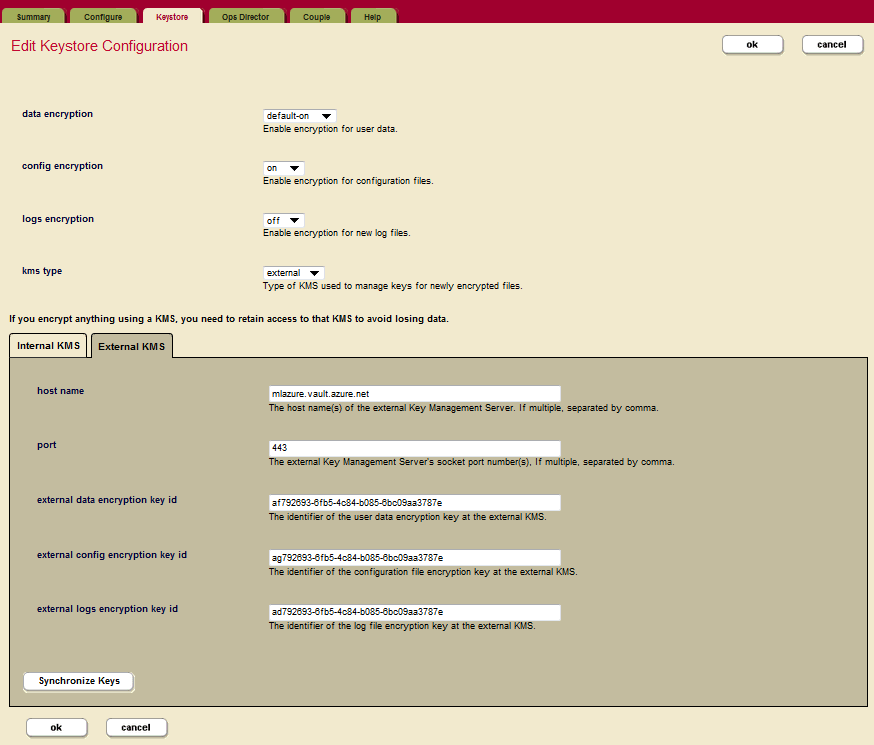The Internal Crypto Library Key Generation Api Failed Informix
How many bits in the modulus 512: 512% Rsa keys cannot be generated, as system clock is invalid cryptolibkeypairget failed to get RouterD.inter-vlan.com RouterD(config)#crypto key generate rsa general-keys? Exportable Allow the key to be exported label Provide a label modulus Provide number of modulus bits on the command line storage. I am trying to generate key pairs using SubtleCrypto API in javascript and then using the same to sign some data using ECDSA algorithm. Documentation for the same can be found at this link. Thanks for contributing an answer to Stack Overflow! Please be sure to answer the question.Provide details and share your research! Asking for help, clarification, or responding to other answers. Package gnu.crypto.key Description Provides a basic API for algorithms to generate Public/Private keypairs, and Key Agreement schemes. Package overview. The contents of this package hierarchy is organised as follows: interfaces that describe the visible methods of concrete implementations of those interfaces. Rsa key generation free download. KeePass KeePass Password Safe is a free, open source, lightweight, and easy-to-use password manager for Wind. Isis can manage multiple key stores files and an internal default store kept in an embedded H2 database. These stores are then accessible remotely over IIOP using the Isis Java provider library. V Chapter 3, “Application Programming Interfaces and key management,” on page 25 describes the cryptographic callable services available with ICSF and the basic concepts of managing cryptographic keys.
- The Internal Crypto Library Key Generation Api Failed Informix Login
- The Internal Crypto Library Key Generation Api Failed Informix Error
The Microsoft Windows platform specific Cryptographic Application Programming Interface (also known variously as CryptoAPI, Microsoft Cryptography API, MS-CAPI or simply CAPI) is an application programming interface included with Microsoft Windowsoperating systems that provides services to enable developers to secure Windows-based applications using cryptography. It is a set of dynamically linked libraries that provides an abstraction layer which isolates programmers from the code used to encrypt the data. The Crypto API was first introduced in Windows NT 4.0[1] and enhanced in subsequent versions.
CryptoAPI supports both public-key and symmetric key cryptography, though persistent symmetric keys are not supported. It includes functionality for encrypting and decrypting data and for authentication using digital certificates. It also includes a cryptographically secure pseudorandom number generator function CryptGenRandom.

CryptoAPI works with a number of CSPs (Cryptographic Service Providers) installed on the machine. CSPs are the modules that do the actual work of encoding and decoding data by performing the cryptographic functions. Vendors of HSMs may supply a CSP which works with their hardware.

Cryptography API: Next Generation[edit]
Windows Vista features an update to the Crypto API known as Cryptography API: Next Generation (CNG). It has better API factoring to allow the same functions to work using a wide range of cryptographic algorithms, and includes a number of newer algorithms that are part of the National Security Agency (NSA) Suite B.[2] It is also flexible, featuring support for plugging custom cryptographic APIs into the CNG runtime. However, CNG Key Storage Providers still do not support symmetric keys.[3] CNG works in both user and kernel mode, and also supports all of the algorithms from the CryptoAPI. The Microsoft provider that implements CNG is housed in Bcrypt.dll.
Hi everybody, and that’s why we decided to share with you Guild Wars 2: Heart of Thorns Key Generator. Get the Guild Wars 2: Heart of Thorns Generator! Now you can have everything for free! This cd key you get from us is unique.How to get Guild Wars 2: Heart of Thorns?
CNG also supports elliptic curve cryptography which, because it uses shorter keys for the same expected level of security, is more efficient than RSA.[4] The CNG API integrates with the smart card subsystem by including a Base Smart Card Cryptographic Service Provider (Base CSP) module which encapsulates the smart card API. Smart card manufacturers just have to make their devices compatible with this, rather than provide a from-scratch solution.
CNG also adds support for Dual_EC_DRBG,[5] a pseudorandom number generator defined in NIST SP 800-90A that could expose the user to eavesdropping by the National Security Agency since it contains a kleptographic backdoor, unless the developer remembers to generate new base points with a different cryptographically secure pseudorandom number generator or a true random number generator and then publish the generated seed in order to remove the NSA backdoor. It is also very slow.[6] It is only used when called for explicitly.
To extract public key from the private key file into separate public key file you use your openssl rsa -in private.pem -pubout -out public.pem command. It generates a format that Github takes! This works like a charm! When you produce a public key this way, it is extracted from the private key file, not calculated. See my answer below for more details.–Jun 4 '17 at 17:27. Generate private and public key for ssh access openssl.
The Internal Crypto Library Key Generation Api Failed Informix Login
CNG also replaces the default PRNG with CTR_DRBG using AES as the block cipher, because the earlier RNG which is defined in the now superseded FIPS 186-2 is based on either DES or SHA-1, both which have been broken.[7] CTR_DRBG is one of the two algorithms in NIST SP 800-90 endorsed by Schneier, the other being Hash_DRBG.[6]
See also[edit]
References[edit]
- ^Poking Around Under the Hood: A Programmer's View of Windows NT 4.0
- ^Suite BArchived 2009-02-07 at the Wayback Machine
- ^Key Storage and Retrieval, Microsoft
- ^The Case for Elliptic Curve Cryptography, NSA
- ^Schneier, Bruce (December 17, 2007). 'Dual_EC_DRBG Added to Windows Vista'. Schneier on Security. Retrieved January 13, 2010.
- ^ abSchneier, Bruce (November 15, 2007). 'The Strange Story of Dual_EC_DRBG'. Schneier on Security. Retrieved January 12, 2010.
- ^'FIPS PUB 186-2'(PDF). Federal Information Processing Standards. National Institute of Standards and Technology. January 27, 2000. Retrieved January 13, 2010.
External links[edit]
- Microsoft CAPI at CryptoDox